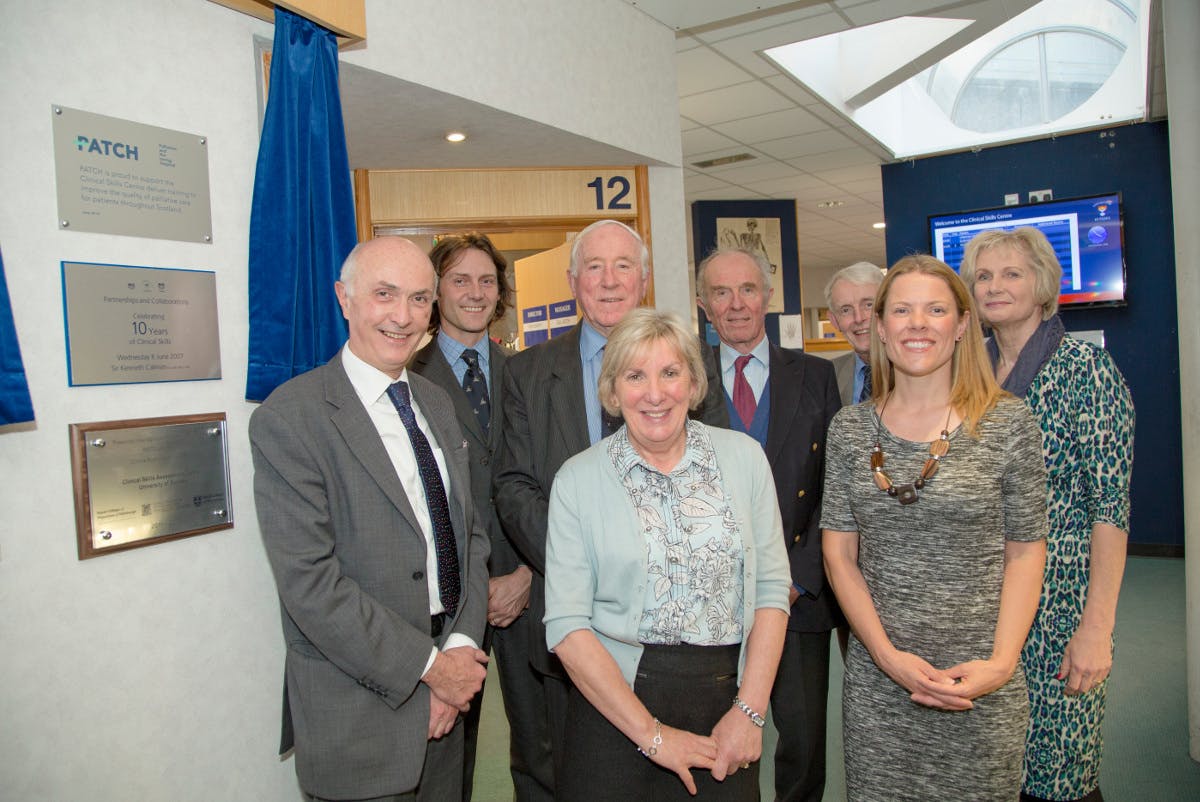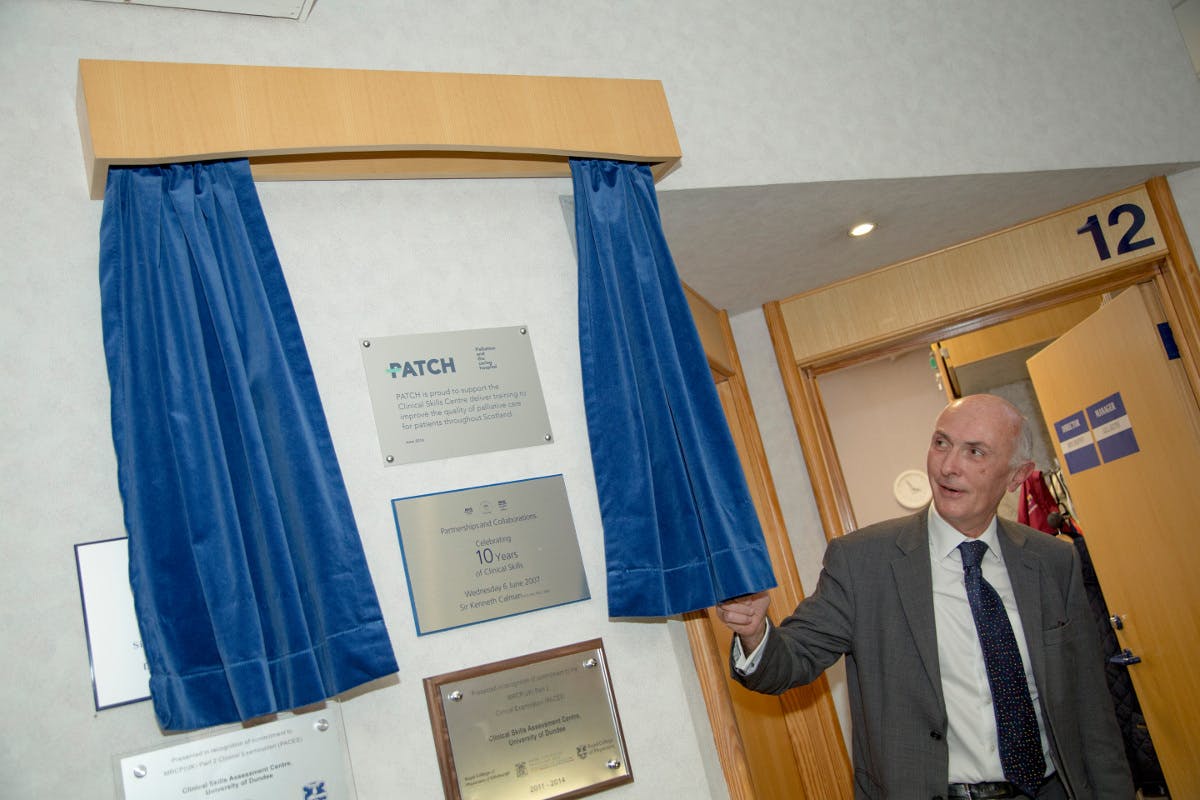PATCH funds communications pilot project at University of Dundee’s School of Medicine
Simulation-based workshops enable healthcare professionals to hold open and honest discussions with their patients.
PATCH (Palliation and the Caring Hospital) has funded a project at The University of Dundee to help doctors care for and communicate more easily with those at the end of life. The support for the project was marked with the unveiling of a plaque at the School of Medicine’s Institute of Healthcare Education (IHSE) in Ninewells Hospital on 1 November 2016.

From L-R: Professor John Connell, Chairman of NHS Tayside; Dr Ben Shippey, Director, Institute of Healthcare Skills Education; Dr Gordon Paterson, Director, PATCH; Mrs Trudy McLeay, Director, PATCH; Sir Michael Nairn Bt, Chairman, PATCH; Sandy McDonald, Consultant for Thorntons LLP; Dr Stephanie Sim, NHS Tayside; Dr Pam Levack, Medical Director, PATCH.
Professor John Connell, Chairman of NHS Tayside, and Dr Ben Shippey, Director of IHSE, were on hand to recognise the unique collaboration between PATCH the University and the NHS.
The three organisations have come together to develop and pilot a series of workshops to equip young healthcare professionals with the skills they need to have honest and open conversations with patients and their families about dying– particularly with those people whose needs might be better served by active palliation of their symptoms rather than other healthcare interventions.

The unveiling of a plaque to recognise a unique collaboration between the University of Dundee, the NHS, and PATCH.
The half-day sessions began in March 2016, and include open discussions, practical opportunities and expert feedback. The activity is simulation-based, with debriefing by skilled faculty using video recordings of conversations with simulated patients and actors.
The School of Medicine ultimately aims to open the workshops to healthcare providers from other institutions around the country, and to share materials and resources needed to deliver the training.
In Western societies we seem to have lost our way with regard to recognising and caring for people who are dying.
Advances in medical technology mean there is an overwhelming pressure to offer treatments to people where the benefit to them is less clear, because it can be psychologically easier for healthcare professionals to commit to unpleasant — and ultimately futile –treatments than to ask ‘are you really sure that’s what you want?’
The skills healthcare professionals need to engage with these open and honest conversations can be learned — and we in the IHSE believe we can deliver that learning effectively and efficiently using simulation-based learning.
The issue of appropriate patient care is a timely one.
Scotland’s Chief Medical Officer Dr Catherine Calderwood used her 2014-15 annual report, Realistic Medicine [1], to challenge healthcare providers to reduce the waste and harm from unnecessary treatments by actively engaging in a process of shared decision making with patients.
And earlier this month, the Academy of Medical Royal Colleges published a list of 40 commonly-used treatments that bring little or no benefit to patients as part of their Choose Wisely campaign [2], which is designed to highlight the need for patients and doctors to talk frankly about how health issues should be treated.
“We hope this training will be a step towards a cultural shift,” Ben said, “such that healthcare professionals acknowledge they can make a real difference by actively managing dying for more patients, and take a step away from delivering what they can do toward asking what they should do for people at the ends of their lives.”
We are so pleased to be able to support this project, as it really reflects one of the serious issues which PATCH was set up to address – the improvement of communication between medical professionals and patients and their families at the end of life.
Should palliative care be the most realistic and best option for patients, it is so important that doctors and nursing staff feel comfortable, equipped and trained to discuss this openly. It requires compassion and understanding and an ability to relate to patients and their families at a time when they are most frightened.
PATCH believes it is vital to be able to discuss what is happening to patients to make a real difference to their care at the end of life.
This is an excellent project and we hope that it is just the beginning for other similar initiatives across the NHS.
Further information
- The Clinical Skills Centre at the University of Dundee delivers high-quality clinical skills and simulation-based education. For more information, visit Clinical Skills Centre – University of Dundee.
References and footnotes
NHS Scotland. (2015). Realistic Medicine, Chief Medical Officer's Annual Report [Accessed: 3 November 2016].
↩Academy of Medical Royal Colleges. (2016). Forty treatments that bring little or no benefit to patients. [Accessed: 3 November 2016].
↩